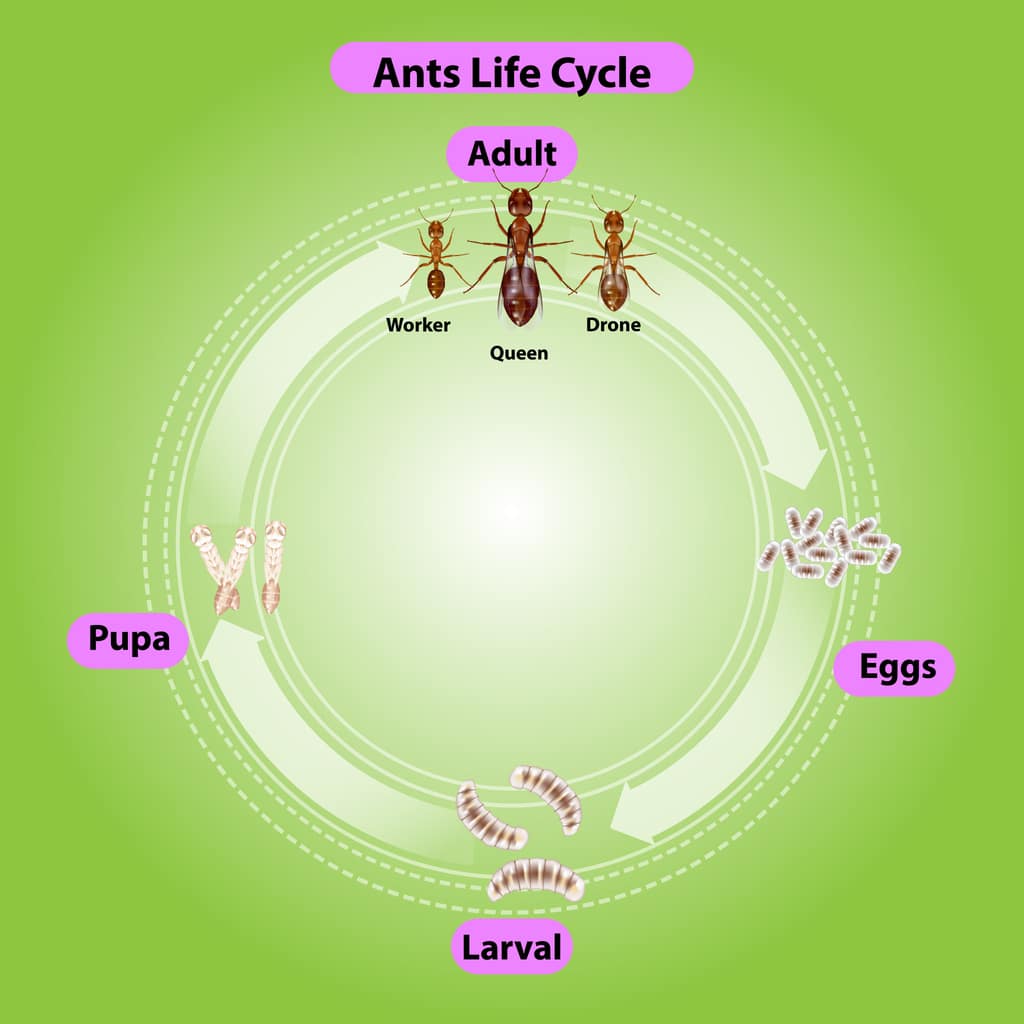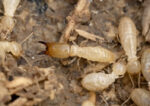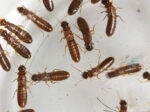
The Life Cycle of an Ant
Ants are more than just tiny insects that scurry around your kitchen or yard. Ants are social insects that are part of a complex and highly organized colony with distinct stages of life and social roles. Understanding the life cycle of an ant can provide insight into their behavior and why professional ant control is often necessary to keep them from invading your home. Let’s explore the fascinating journey of an ant from egg to adult and how this process affects the structure of their colony.
The Stages of Ant Life
Ants undergo complete metamorphosis, passing through four main stages. These life stages are eggs, larva, pupa, and adult. Each stage plays a critical role in the growth and development of the colony.
Egg: The Beginning of Ant Life
Ant life begins as an egg. Queen ants, which can live for several years, are responsible for laying eggs within the nest. Unlike male drone ants, which have a much shorter lifespan, the queen continuously produces eggs to ensure the colony’s survival. These tiny, oval eggs are often hidden in nests located outside in mulch, tree cavities, or the yard. However, in more severe infestations, eggs may also be found inside the home, nestled in concealed areas like walls, attics, or under floorboards.
Larva: Growth and Development
After hatching from the egg, the ant enters the larval stage. During this phase, the larvae are fed by worker ants and the larvae grow rapidly. They have no legs, are dependent on their caretakers, and focus solely on consuming food to fuel their development. This stage is crucial for the eventual success of the colony, as strong, healthy larvae will develop into productive adults. The larvae remain within the nest, shielded from external threats, until they are ready to pupate.
Pupa: Transition to Adulthood
Once the larva has grown sufficiently, it becomes a pupa. In this stage, the ant undergoes a dramatic transformation, much like a caterpillar turning into a butterfly. The pupa may be encased in a silk cocoon and will develop and emerge as an adult ant. During this time, the pupae are kept safe within the nest, which may be hidden both outdoors and indoors in hard-to-reach places. The pupal stage is a delicate period, and the colony’s survival depends on protecting these future workers, soldiers, and queens.
Adult: The Final Stage
Once the transformation is complete, the pupa emerges as an adult ant. Adult ants take on various roles within the colony, from foragers and workers to soldiers and queens. The social structure of the colony is highly organized, with each ant contributing to the survival of the group. While queen ants focus on reproduction, worker ants maintain the nest, care for the young, and search for food. Male drone ants, on the other hand, have a brief role in mating and then die shortly afterward. Most homeowners have probably seen large ant swarms inside or outside your home, and these swarms can be a key indicator of a nearby nest, often signaling the presence of a well-established colony.
Ant Colony – Structure and Development
An ant colony is a sophisticated system where every ant has a specific role. The colony operates like a well-oiled machine, with worker ants tending to the queen, larvae, and nest while foraging for food to sustain the group. The colony’s development depends on the queen’s ability to lay eggs and the workers’ effectiveness in protecting and nurturing the young. If you spot large numbers of ants, particularly swarming ants inside your home, it could indicate that the colony has set up residence in your walls, attic, or another concealed area.
Roles Within the Colony of Ants
The hierarchy within an ant colony is vital to its survival. Queens are the colony’s lifeblood, laying thousands of eggs throughout their long lives, which can span several years. Worker ants, typically sterile females, handle everything from food gathering to nest maintenance. Soldiers defend the colony from threats, and male drones exist solely for reproduction. The life cycle of each ant is intertwined with the colony’s success, making it essential to disrupt the entire system when dealing with an infestation.
Protect Your Home with Professional Ant Control
No matter the type of ant or the size of the infestation, professional ant control is essential for eliminating the problem at its source. Ant colonies can thrive both inside and outside your home, hiding in places that are difficult to reach without the right expertise and tools. At Hulett Environmental Services, we specialize in preventing and controlling ant infestations in Palm Beach County and the Treasure Coast. With over 50 years of experience, we know how to keep your home ant-free year-round. If you’re noticing signs of an ant infestation, such as swarms or trails of ants, remember to Just Call Hulett for a free inspection and customized treatment plan today!



